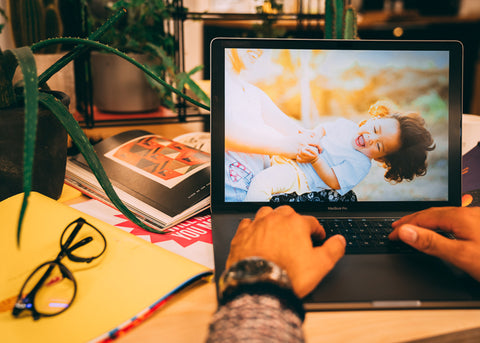There are various methods of filtering blue light on your Mac to make it user-friendly for you at night. You can attach specialized screen protectors, you can put on computer glasses, you can use software applications and you can also manually alter the settings of your Mac to reduce blue light emission.
Use a blue light filter app
There are several apps available that can filter blue light on a MacBook. These apps usually allow you to adjust the intensity of the filter and set a schedule for when the filter should be on. Some popular options include f.lux and Night Shift.
f.lux is free and easy to use and is available for a variety of platforms, including Windows, macOS, Linux, and iOS. This makes it a convenient option for people who use multiple devices and need a consistent blue light filter solution across all of them.
One potential downside of using these apps is that it can affect the color accuracy of your display. Because it adjusts the color temperature of your display, it can make colors appear warmer or cooler than they actually are. This can be a problem if you need to use your computer for tasks that require accurate color reproduction, such as photo editing or design work. It may also slow down the speed of your device.

Use the built in blue light filter
If you have a newer MacBook running macOS Big Sur or later, you can use the built-in blue light filter by going to "System Preferences" > "Displays" > "Night Shift." From here, you can adjust the intensity of the filter and set a schedule for when it should be on.
A built in blue light filter is convenient, customisable and generally easy to use. However, they are generally not available on older device models. Although built-in blue light filters allow for some customization, they may not offer as much flexibility as other options, such as a blue light filter app like f.lux. Some people may find that a built-in blue light filter is not as effective at blocking blue light as other options, such as physical blue light filters or blue light blocking glasses.
Use a physical blue light filter
Another option is to use a physical blue light filter, such as a screen protector to block blue light from reaching your eyes. These filters are typically made of a special film that absorbs or reflects blue light, and they can be easily attached to your MacBook's screen.
Using a screen protector can be a convenient and cost-effective way to reduce your exposure to blue light while using your MacBook. Check out our guide on 5 things to look out for when buying a computer screen protector.
Use blue light blocking glasses
Blue light blocking glasses are glasses that have a special coating or lens that absorbs or reflects blue light. They can be worn while using your MacBook to help reduce the amount of blue light that reaches your eyes.
Blue light blocking glasses can be very effective at reducing the amount of blue light that reaches your eyes. They can be particularly helpful for people who are sensitive to blue light or who need to reduce their blue light exposure as much as possible. However, depending on your needs, it may be inconvenient to have to wear blue light blocking glasses all the time or to switch between multiple pairs of glasses for different tasks.
There are several ways to block blue light on a laptop to suit every budget. Some options, such as blue light filter apps and built-in blue light filters, are relatively inexpensive and can be easily downloaded and installed on your laptop. Other options, such as physical blue light filters and blue light blocking glasses, may be more expensive but can be more effective at reducing blue light exposure. Ultimately, the best blue light filter solution for you will depend on your budget, your needs, and your personal preferences. It may be helpful to experiment with different options to find the one that works best for you. Get in touch via customerservice@ocushield.com for some bespoke advice on blue light blocking solutions.
How we reviewed this article:
Ocushield has strict sourcing guidelines and relies on peer-reviewed studies, academic research institutions, and medical associations.
- Research progress about the effect and prevention of blue light on eyes www.ncbi.nlm.nih.gov/pmc/articles/PMC6288536/
- f.lux® software to make your life better justgetflux.com/faq.html
Our experts continually monitor the health and wellness space, and we update our articles when new information becomes available.
Written By
Dhruvin Patel | BSc Hons, MCOptom, Optometrist
Edited By
Omba Kumwenda | BA, MEng
Medically Reviewed By
Asad Hamir | BSc Hons, Optometrist
Copy Edited By
Tara Tadlock | MA

Leave a comment